 Detour back to Welles without getting all the way back to Welles: When is the film finished?
Detour back to Welles without getting all the way back to Welles: When is the film finished?Please read the Class Policies page now.
TENTATIVE SCHEDULE: (Please expect some changes to be made to the schedule from time to time during the semester--I will announced them well ahead of time both in class and by email).
August 26: IS FILM OVER? WHAT IS THE FUTURE OF DIGITAL FILM?
FIRST ASSIGNMENT: due August 27, by 5 p.m. Two discussion questions, numbered 1 and 2, with your first and last name after them, on the bottom of the document, on Paolo Cherchi Usai, selections from The Death of Cinema: History, Cultural Memory, and the Digital Dark Age (click on the blue link to get the pdf) Email your DQs in one word document (as an attachment) to me at [email protected].
August 28: "The End" of Cinema:
Required Reading:
Paolo Cherchi Usai, selections from The Death of Cinema: History, Cultural Memory, and the Digital Dark Age
Be sure to bring your copy of the pdf of selections from Paolo Cherchi Usai's book with you to class, Thursday, August 28.
Touch of Evil (posthumously restored in 1998, according to Welles' memo to Universal Studios)
Case Study of Film Philology: Orson Welles' Touch of Evil (three versions; theatrical, reconstructed; preview)
(Key differences between the three versions: aspect ratios 1.37.1 & 1.85.1; soundtracks; editing)
Opening Three-and-a-half Minute Crane Shot
ASSIGNMENT Due September 1, by 5 p.m. Three BIG WORDS and two discussion questions, numbered 1 and 2, with your first and last name after them, on the bottom of the document, on Orson Welles' memo. Email your DQs in one word document (as an attachment) to me atat [email protected].
September 2: Touch of Evil (theatrical version)
Due September 3, by 5 p.m. Three BIG WORDS and two discussion questions, numbered 1 and 2, with your first and last name after them, on the bottom of the document, on Touch of Evil (theatrical version). Email your DQs in one word document (as an attachment) to me at [email protected].
September 4: Touch of Evil (theatrical version).
I assume you all are now clear that discussion questions are always due on Mondays by 5 p.m. and on Wednesdays by 8 p.m. So I will no longer indicate the due dates on this webpage.
Trailers 1 and 2) to Paul Schrader's The Canyons (2012)
Side By Side: The Science, Art and Impact of Digital Cinema
Chacun Son Cinéma (To Each His Own Cinema)
Lumière and Company (1995)
Matthew Battles, KERN YOUR ENTHUSIASM
September 9:
Required Reading:
Chapter on Touch of Evil in James Naremore's The Magic of Orson Welles
Optional Reading: Henri Langlois and the Film Archive
September 11: Othello (dir. Orson Welles, 1952) the Criterion Collection Laserdisc Edition of Orson Welles' Othello / Audiocommentary
Required Readings:
Paolo Cherchi Usai, David Alexander Horwath, Michael Loebenstein, ed. Film Curatorship: Museums, Curatorship and the Moving Image (pp. 8-27)
First paper due September 12 by 11:59 p.m. Persuasive essay, , 650 words.
First Detour: The Forensics of Restoration, CSI, Painting, Forgery, Copy
September 16:
Required Readings:
Carlo Ginzburg, “Clues: Morelli, Freud, and Sherlock Holmes,” in History Workshop, No. 9 (Spring, 1980), pp. 5-36.
Paolo Cherchi Usai, David Alexander Horwath, Michael Loebenstein, ed. Film Curatorship: Museums, Curatorship and the Moving Image (chapter three, pp.107-29)
"How DNA Changed the World of Forensics" NY Times, May 18, 2014
Optional Reading: D.A. Greetham, "Textual Forensics"; Sir Arthur Conan Doyle, "A Case of Identity" (1899) and "The Adventure of the Cardboard Box" (1893); Sigmund Freud, "The Moses of Michelangelo" (1914) Standard Edition, 13: 209-238. Digital "Exploded Manuscript" of Freud's essay.
DAVID GRANN, "The Mark of a Masterpiece: The man who keeps finding famous fingerprints on uncelebrated works of art" New Yorker July 12, 2010
Painter charged with making fake Jackson Pollock paintings (July 2014)
Optional Viewing:
Peter Greenaway, Goltzius and the Pelican Company (2009).
Second Detour: Film as a medium of haunting, of ghosts, of change mummified, specters (of evidence).
September 18:
Required Reading:
Sheridan Lefanu, (online here) "Schalaken the Painter"
Required Viewing:
Schalacken the Painter BFI (dir. Leslie Megahey, 1979)
Scarlet Street (dir. Fritz Lang, 1945)
September 23:
Required Readings:
Sheldon Pollock, "Future Philology? The Fate of a Soft Science in a Hard World"
Optional Reading:
September 25:
Required Viewing:
Tim's Vermeer (2014)
Sinister (2013)
Required Reading:
Errol Morris "Vermeer Forgery" NY Times (article), on "Vermeer Forgery" NY Times (Images); (CLICK BOTH MORRIS LINKS, article and images);
Optional Reading: DAN BILEFSKY, "After 400 Years, Still Hot on the Trail," NY Times, November 19, 2010 (on the exhumation of 16th-century Danish astronomer Tycho Brahe's remains to determine the cause of his death); Peter Landesmann, "A Crisis of Fakes," New York Times, March 18, 2001, 36-41; 52; 55; 66; 78; Anne Eisenberg, Holograms as motion pictures, "New York Times, December 4, 2010; Mark Segoff, "Restoring and Reproducing Art"; Dutch Still Lives (17th Ct.) with x-rays of layers of paint; Still Lives with online annotation popups; L#st F*ct%ons: Caragio's Musan
On the Way: Film is Dead, Again (media archaeology)Optional Reading:
Siegfried Zielinski, Deep Time of the Media: Toward an Archaeology of Hearing and Seeing by Technical Means
September 30: Jean-Luc Godard, Contempt / Le mepris (1963) end of Cinecittà film studio and the geology of film)
October 2: Paul Schrader, The Canyons (2012)
 Detour back to Welles without getting all the way back to Welles: When is the film finished?
Detour back to Welles without getting all the way back to Welles: When is the film finished?
Required Readings:
Honoré de Balzac, The Unknown Masterpiece (trans. Richard Howard)
Honoré de Balzac, Pierre Grassou (trans. Katharine Prescott Wormeley)
October 7: On the Way for a Day: What is Philology?
Required Readings:
Sheldon Pollock, "Future Philology? The Fate of a Soft Science in a Hard World"
Jean Bollack and Priscilla H. Barnum, "Texts and Their Interpreters: The Enterprise of Philology," SubStance, Vol. 22, No. 2/3, Issue 71/72: Special Issue: Epistémocritique (1993), pp. 315-320.
Seth Lerer and Joseph A. Dane, "What is a Text?," Huntington Library Quarterly vol. 58 no. 1 (1995), 1-10.
Optional Reading:
Selections from James Turner, Philology: The Forgotten Origins of the Humanities
October 9: Jacques Rivette, La belle noiseuse (1991) (long version)
October 14:
Van Gogh Repetitions, ed. Eliza Rathbone, William H. Robinson, Steele Elizabeth and Marcia Steele
Juan Luis Borges, "Pierre Menard, Author of Don Quixote"
Optional Reading:
Jorge Luis Borges, "Funes el memorioso." English trans.
David Francis, "From Parchment to Pixels"
Dead Sea scrolls to go online
By DAILY MAIL REPORTER
UPDATED: 02:44 EST, 28 August 2008
McGann, Jerome J., A New Republic of Letters: Memory and Scholarship in the Age of Digital Reproduction
October 16: Required Viewing:
Jacques Rivette, La belle noiseuse (short version)
Detour 6: the Romance of the Copy
October 21: Required Viewing: Certified Copy (dir. Abbas Kiorastami, 2010)
Optional Reading:
Verbatim: What Is a Photocopier? | Op-Docs | The New York Times
October 23:
Certified Copy (dir. Abbas Kiorastami, 2010) discussion continued
Required Reading:
J.L. Carr, A Month in the Country, 3-80
October 28:
Required Reading:
J.L. Carr, A Month in the Country, 81-135
October 30: Required Viewing: Orson Welles, F for Fake (1972)
(the impossibility of a fake, forged film; Welles's cinematic reconstructions of "hoaxes"; shots of his editing table, surrounded by cannisters of film addressing the camera, the "male" gaze, and so on)
Fourth Detour: The Theology of Restoration (Restoration, res-err-ection, and reanimation--art historian--Cathedral--and death). The destruction of paintings and / or their restoration.
November 4:
Required Reading:
Georges Didi-Huberman, "The Absent Wound" (Holy Shroud of Turin)
Laura Mulvey, "Preface" to Death 24x a Second: Stillness and the Moving Image (2006)
November 6:
Required Viewing:
Don't Look Now (dir. Nicholas Roeg, 1973)
Optional Reading: Hans Beltung on Saint Veronica; Barbet, Passion of Our Lord Jesus Christ
November 11: No Class
November 13:
From Geology to Theology:
Required Viewing:
Journey to Italy (dir. Roberto Rossellini)
Required Reading:
Laura Mulvey, "Roberto Rossellini's Journey to Italy," in Death 24x a Second: Stillness and the Moving Image (2006)
November 18:
Required Viewing: Pier Palo Pasolini, Gospel According to St. Matthew
Optional: Mel Gibson, The Passion of the Christ; Monty Python's the Life of Brian; Kenneth Anger, Scorpio Rising Gibson passion with Sistine chapel restoration debate. Catholic paintings. Shroud disAppeanance of Jesus.
Final Detour: Music and Philology
November 20:
Required Viewing:
Tous les matins du Monde (dir. Alain Corneau, 1992)
Required Reading:
Laura Mulvey, "Passing Time" in Death 24x a Second: Stillness and the Moving Image (2006)
Second Paper, Due Saturday November 22 by 11:59. (Click on the link for instructions.) email it to me at [email protected] You will need a title for your paper and a thesis, an argument that you can state in one sentence. Your thesis should go at the end of your first paragraph. See Paper Guidelines. Grading: If you don't put your name on your paper, it's an automatic E. If you don't have a proper title, it's an automatic E. If you don't have a thesis, it's an automatic E. One third of your grade will be based on your title; one third on your thesis; and one third on the rest of your paper.
November 25:
Required Viewing: Kristof Kieslowski, Blue (1993) (posthumous forgery of incomplete musical composition, performed on the soundtrack after completed by widow, also the original composer, but pseudonynmously published)
Recommended: Gesualdo: Death for Five Voices (dir. Werner Herzog, 1995)
November 27: Thanksgiving
December 2: This part of the course will be run as a workshop. TBA
December 4: This part of the course will be run as a workshop. TBA
December 9: This part of the course will be run as a workshop. TBA
Evaluations and class discussion.
“Students are expected to provide feedback on the quality of instruction in this course by completing online evaluations at https://evaluations.ufl.edu. Evaluations are typically open during the last two or three weeks of the semester, but students will be given specific times when they are open. Summary results of these assessments are available to students at https://evaluations.ufl.edu/results/.”
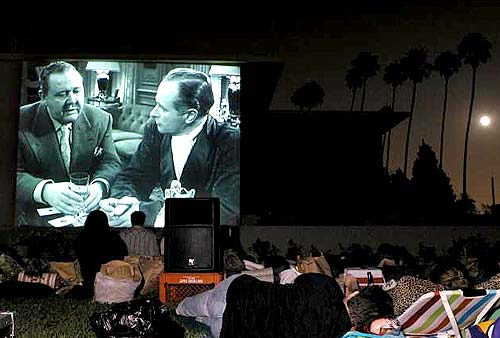
Required Reading:
Amy Knight Powell, Depositions
Bruno Latour and Adam Lowe, "The Migration of the Aura: or How to Explore the Original through its Facsimiles"
Optional Reading:
Robert S. Nelson, "The Slide Lecture, or the Work of Art "History" in the Age of Mechanical Reproduction," Critical Inquiry, Vol. 26, No. 3, (Spring, 2000), 414-434; Walter Benjamin, "The Work of Art in the Age of Mechanical Reproduction."
Encuentran una película perdida de Orson Welles
The Mystery of Picasso (dir. Henri-Georges Clouzot, 1956)
(One possibility: Is It Worth Restoring? The case of Fritz Lang's Metropolis)
Comparative Film Philology: Everyone will watch the most recently restored version on blu-ray at the screening, Fritz Lang, The Complete Metropolis; additionally, one half of the class will watch the previously restored verion, and the other half of the class will watch the 1984 Giorgio Moroder version). Everyone will have watched two out of the three versions before we meet in class to discuss them.

Fritz Lang, The Complete Metropolis (Most Recently Restored Authorized Edition)

Fritz Lang, Metropolis (Most Recently Restored Authorized Edition)

Fritz Lang, Metropolis, Giorgio Morodor 1984 soundtrack
Fritz Lang, Three Metropolis restorations compared philologically in class.
Recommended: Liner Notes on Restorations of Berlin, die Sinfonie der Großstadt / Melodie der Welt (2 DVDs)
Walther Ruttmann (Regisseur)
Carl Dreyer, Passion of Joan of Arc, two film projection speeds (20 and 24 frames per second) and two soundtracks in the Masters of Cinema blu-ray edition; in class comparison with the two soundtracks on the Criterion DVD edition, and Jean-Luc Godard, Vivre sa vie (Her Life to Live)
 |
 |
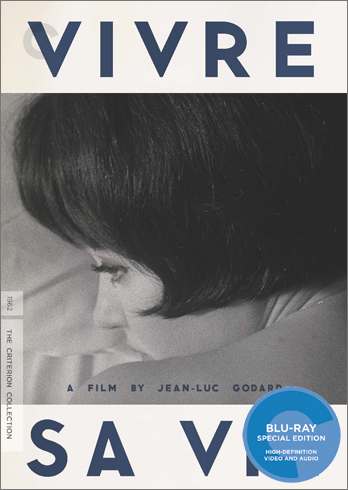 |
Carl Dreyer, Passion of Joan of Arc, Masters of Cinema blu-ray and Criterion DVD editions and clip in Godard's Vivre sa Vie when Nana and her john go to see Dreyer's Passion of Joan of Arc.
Stills from the Criterion and MofC DVDs
Recommended: Entuziazm (Simfonija Donbassa) (2 DVDs) Dziga Vertov (restored and unrestored versions)
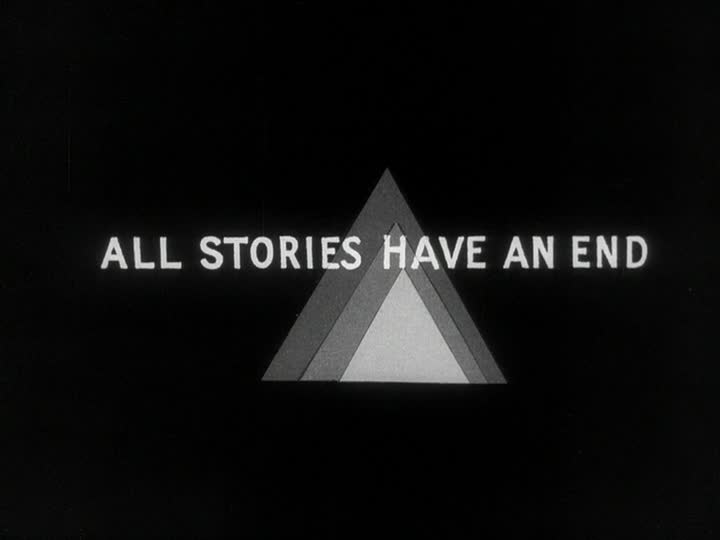

Shh! It's "The End!"
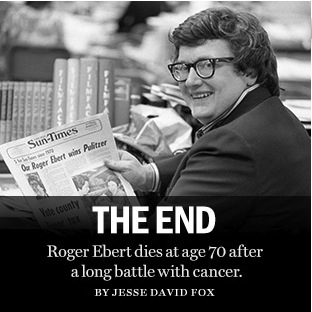

"Shh" in Silent Movie (1976)
Silent "Shh" in Sinister (2013)
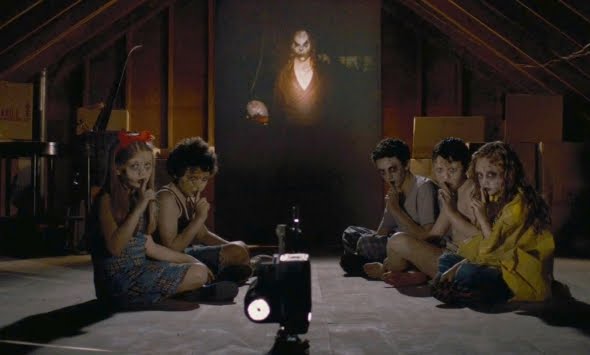



Whatever Happened to Baby Jane (dir. Robert Aldrich,1962)
Recommended: Sunset Boulevard (dir. Billy Wilder, 1950)
Detour, Again, What is Philology?
Screening: Comparative Film Philology: Everyone will watch the most recently restored version on blu-ray at the screening, Fritz Lang, The Complete Metropolis; additionally, one half of the class will watch the previously restored verion, and the other half of the class will watch the 1984 Giorgio Moroder version). Everyone will have watched two out of the three versions before we meet in class to discuss them.

Fritz Lang, The Complete Metropolis (Most Recently Restored Authorized Edition)

Fritz Lang, Metropolis (Most Recently Restored Authorized Edition)

Fritz Lang, Metropolis, Giorgio Morodor 1984 soundtrack
Fritz Lang, Three Metropolis restorations compared philologically in class.
Screening Carl Dreyer, Passion of Joan of Arc, two film projection speeds (20 and 24 frames per second) and two soundtracks in the Masters of Cinema blu-ray edition; in class comparison with the two soundtracks on the Criterion DVD edition, and Jean-Luc Godard, Vivre sa vie (Her Life to Live)
 |
 |
 |
Carl Dreyer, Passion of Joan of Arc, Masters of Cinema blu-ray and Criterion DVD editions and clip in Godard's Vivre sa Vie when Nana and her john go to see Dreyer's Passion of Joan of Arc.
Stills from the Criterion and MofC DVDs
Cronenberg, Criterion Scanners
Cronenberg, Criterion Videodrome
The Artist and the Model (French: L'artiste et son modèle) directed by Fernando Trueba
Gerhard Richter Painting (dir. Corinna Belz, 2011)
De Quincey, "Palimpsest"
1. A Closer Look: Deceptions and Discoveries
2. Christopher S. Wood, "Renaissance Anachronism"
Recommended: Hypothesis of a Stolen Painting (Raul Ruiz, 1979) and A Closer Look: Fakes, Mistakes, and Discoveries (National Gallery, 2010)
The Mona Lisa Revealed DVD and The Lost Leonardo episode of 60 Minutes DVD.
Stanley Kubrick and aspect ratio / headroom
And a final turn to psychonalysis and fetishism
The fetish of the facsimile (the fetishes of "materiality," of "History"):
Facsimile editions Kafka, Nietzsche 1980s; Facsimile of manuscript page in James Hogg's Confessions of a Justified Sinner; editiorial interventions in Sheridan Lefanu's A Glass Darkly (the editor is already a character in nneteenth-century British lit before that literature is published in modern critical editions.
Bruno Latour on the facsimile
Add fake Carlton Shakespeare Folio facsimile. Add history of the book on Bible.
Recommended Reading on the Unfinished Work of Art as Monstrosity
Selections from Giorgio Vasari's Lives of the Artists on Leonardo's Cave (get on UF course reserves) Zeuxis / Pygmalion versus the Medusa
Robert Browning's dramatic monologue, "My Last Duchess."
Recommended: Liner Notes on Restorations of Berlin, die Sinfonie der Großstadt / Melodie der Welt (2 DVDs)
Walther Ruttmann (Regisseur)
4.5 empiricism, positivism, the law, evidence versus
reconstitution, restoration, resurrection, haunting, contact (shroud), relics, metaphysics of presence, theology, Last Supper—
Passio—burned by archivist Paolo Cherchi
comparative philology: variants; signatures; the devil is in the details)
D.N. Rodowick Virtual film (obsolete in that it assumes celluloid is the gold standard,)
Invisible Ink; lemon on bread, toasted: Jesus on toast.
Kristie Macrakis, Prisoners, Lovers, and Spies: The Story of Invisible Ink from Herodotus to al-Qaeda (2014)
My "spectral" photos from Krakow, 2007
1. David Freedberg, The Power of Images (restoration of damaged art): (get on UF course reserves)
2. Tobin Siebers "Disability and Art Vandalism"
3. German Renaissance religious iconoclasm
What is a critical edition of a film? Examples of Criterion editions and Masters of Cinema editions. What is a critial edition of a literary text? Of a sacred text?
Article on Criterions (2008)
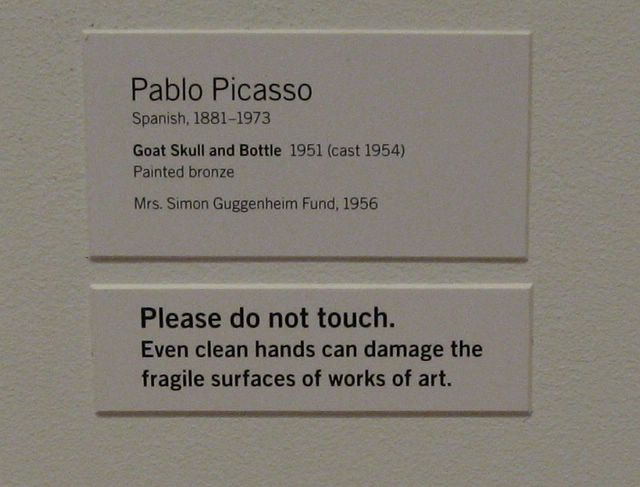
Do Not Touch ( "Some at MoMA Show Forget ‘Look but Don’t Touch’" nude performers touched by museum visitors (2010)
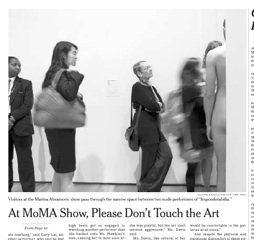
No touching in Bergman's Persona (image of mother) or film image of gangters' girlfriend in Branded to Kill

In class stop-motion animation scenes with a moving camera mounted on a tripod in Dziga Vertov's Man with a Movie Camera (1929) and clips of Vertov as cameraman. 1080i (interlaced) versus 1080p (progressive) transfers from analogue to digital.
Video Killed The Cinema? Sound Killed the Cinema? (clips with Gloria Swanson watching her silent films from Billy Wilder's Sunset Boulevard [1950])
Four and three quarters detours
1. History of the book
What is philology?
Biblical hermeneutics
Literary criticism
What is modern editing of a previously published text?
Textual philology / editing / critical editions / scholarly apparatus / “context”
Biographical / genetic criticism
Textual Forensics (crime scene reconstruction)
Preservation versus destruction (burning)
2. Literature
Romance genre. Missed chance. Love letters; Genres: literature: short ghost story
Balzac, An Unfinished Masterpiece
Balzac, Pierre Grassou
J.L. Carr, A Month in the Country
Frankenstein two versions, ed. Charles E. Robinson
De Quincey on the human brain as a palimpsest in Suspiri de Profundis
Also post hourly published ghost stories. Gothic novels. The found manuscript
in Joseph Sheridan Lefanu; M. R. James
Forgery/ fiction vs."real" thing, or "original."
Detective fiction (clues / details); mystery,
3. Art restoration
iconoclasm; destruction
Girl with a Pearl Earring (dir. Peter Webber, 2003)
Tim's Vermeer (2014)
Van Gogh (dir. Maurice Pialat, 1991)
Recommended Reading: Francis Galton, Fingerprints
Renoir (Gilles Bourdos, 2014)
The Artist and the Model (French: L'artiste et son modèle) directed by Fernando Trueba
The Mystery of Picasso (dir Henri-Georges Clouzot, )
Gerhard Richter Painting (dir. Corinna Belz, 2011)
Whatever Happened to Baby Jane (dir. Robert Aldrich,1962)
Recommended: Sunset Boulevard (dir. Billy Wilder, 1950)
The archive, vault / pre-digital library in Party Girl / Touch of Evil "archive"; Apocalypse Now, "complete Dossier"; Tour of rare books room in Library East.
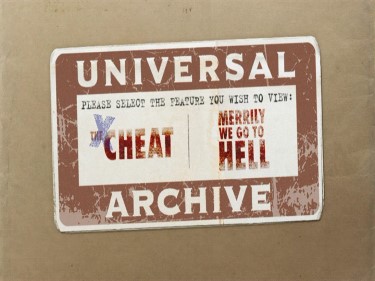
Requirements (I repeat): Bring copies of any of the required books (slisted below) in print on paper (not in electronic form) to class as required; co-lead class discussion twice, once on a Tuesday and once on a Thursday; two discussion questions and three or more "BIG WORDS" for each class; student formulated quizzes each class approved by me; one film clip analysis exercise; and three 500 word papers; willingness to reflect, think, respond, by paying very, VERY, VERY close formal attention to texts and films.
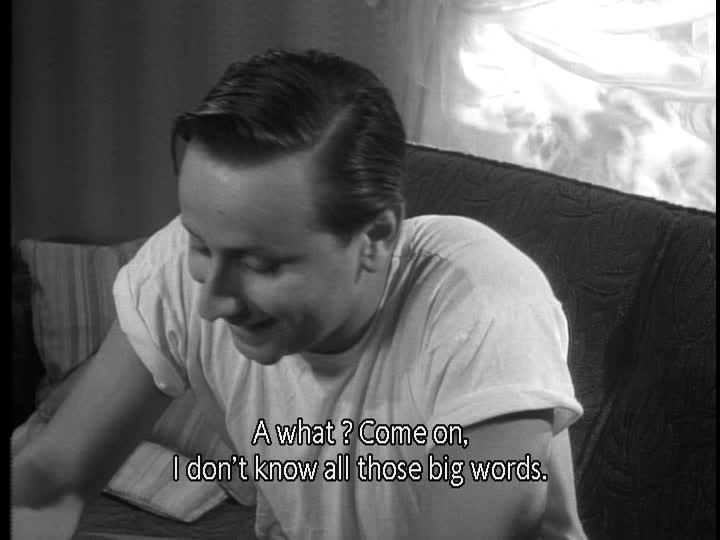
B. BIG WORDS (at least 3) defined, if we are discussing a text:
Many of the readings will be difficult, partly because the vocabularies the writers use contain technical terms you probably won't know as well as "big words" you may not know. Since you can easily go to wiktionary to look up the meanings and etymologies of words you don't know, I ask that you include at least three words you had to look up with your discussion questions. That will help everyone in the class. And since this is an English class, you should want to expand your vocabulary, no? :) Words also have histories. You may want to consult the Oxford English Dictionary online through UF.
1. Got to Databases and type in "OED" and then hit "Find."

You will get to this page. Double click on "Oxford English Dictionary."

You will get to OED at this page, where you can look up words of interest.
BUT WAIT! THERE'S MORE!! Uf librarians sometimes linked the assigned reading to the online book from which the reading comes. So you have to go here http://www.uflib.ufl.edu/
or,if you are off campus, here
http://www.uflib.ufl.edu/ufproxy.html so you can get to the link above.
Once you are here, http://www.uflib.ufl.edu/,
you'll see a column of tabs on your left. Look down until see the ones
in grey and click on "Course Reserves." Left click you mouse over
"Course Reserves" and that will take you here to this webpage:
https://login.ufl.edu/idp/Authn/UserPassword
Once you are in Course Reserves (ARES), you need to find our course and the reading.
To save time for class discussion of the readings and / or films, I have
put these policies online. Please read this page now and please read
both the short versions and the long version carefully.
Short Version:
This class cannot work unless you want to be here.
In other words, if you're going to be here, you really have to be here.
Therefore, in order to really be here, you have to want to be here.
In short, if you are going to be here, you really have to be here.
Long Version:
1. Preparation for class discussion. The price of admission to class is to bring a print, not electronic, copy of the readings with you to class. That means you will need to bring the original or a xerox. The printed out readings are your ticket. I will ask you to take them out at the beginning of class. Again, a paper copy is necessary. Kindles and pdfs on computers are not valid. Kindle and other ebook editions do have not have page numbers and do not have the same scholarly apparatus that print editions of books do. They are therefore unsuitable for class discussion. I prefer paper to electronic documents because the former is a codex, a random access machine, and far superior to online documents, all of which are scrolls, the storage device the codex replaced thousands of years ago. Kindles and other ebooks have no page numbers. Although it is possible to annotate online documents, it is much easier to annotate a paper document and to remember and find what you annotated or underlined where you did. You can even take longer notes on the flyleaves of a book. Some electronic documents have one advantage over paper documents: you can search a pdf or a kindle for a particular word or phrase and find it immediately. An electronic document that has been scanned from paper cannot be searched, however. You need to bring a copy of the assigned articles or book to class the day we are discussing it in detail, reading it closely. If you don't have a copy you cannnot effectively participate in class. Therefore, you must have a copy to be counted as present. Since we'll be talking about the readings in some detail, you'll need to be able to turn to the page we're discussing. If you do not have a print out, paper copy of the reading or readings, your own personal copy, I will ask you to go home.
2. Discussion questions. If you don't turn in the discussion questions, I count you as absent. In addition to writing the DQs, I ask that you write any "big" words you had to look up and their definitions. Depending on your vocabulary, you may need to look up a lot of words or only one or two. DQs without "big" words and their definitions will not count as passing work.
3. Lateness: If you come late to class after the second week of the semester. you will automatically fail the course. If you are taking a class that begins at 8:30, make sure you get up early enough to make it class on time. If you are thiking of taking a bus that may be late from time to time, take an earlier bus. Think of arriving to class as you would arriving for an airplane flight. Get there early or you will miss the class, just as you miss yor flight if you arrived late. I have adopted this policy because a late arrival is a disruption of the class (as is sleeping in class). By the third week of the semester, if you are one second late or twenty minutes late or any other amount of time late, the penalty you meet will be the same: an "E" in the course.
4. On two period class days, I will have us take a brief break (a minute or two) in the middle of class. If you have not made a reasonably valuable comment on the readings by then, I will ask you to go home rather than remain an uninspired bump bringing the mood of the class down. By "reasonably valuable comment" I mean a comment that make dense in he context of the discussion. Talking just to blurt out an irrelevant comment is not valuable. You will not receive better than a "C" in the course if you do not attend and participate in class. So even if all your written work is "A" level (or "B") but you have not participated in class discussion, you will receive a "C" for the course.
5. Computers are not allowed to be used in class. Please turn off your cell phones and computers before class. Take notes with paper and pen or pencil.
6. Attendance: Class attendance and participation are crucial to the success of this course. By "attendance" I mean not only being in class, but includes completing the assigned work for each class by the time it is due and arrving to class on time. (If you arrive late to class or if don't do the discussion questions, you are counted as absent.) By participate, I mean attend class, do the discussion questions, and speak up usefully in class so that a given conversation moves forward. Talking but not adding anything is not participating. You can participate by bringing up a topic, adding to someone else's point, or disagreeing, among other ways. Just making random comments that lead us nowhere does not count as participartion. If, in addition to not participating, you don't turn in written work, you will not pass the course. I take attendance, and late arrivals will be counted as absent. After the first few classes, when I have learned your names, I will take roll silently in class instead of taking it aloud.
You may miss two classes for whatever reason without offering an explanation to me. If you are absent one time or two times, in other words, do not give me an excuse. None is needed and none will be heeded. Missing more than two classes (for whatever reason) may result in a reduction of your final grade for the course, the degree of the reduction to be determined by me at my discretion (depending on the circumstances, I may not lower your final grade at all or I may lower your final grade to an "E"). Missing four classes (or more) means either that you need to withdraw from the course or that, if you do not withdraw, you will get an "E" as your final grade.
Theodor Adorno, Richard Leppert (Editor), Susan H. Gillespie Essays on Music
Written and Related Work: Co-lead class discussion twice, once on a Tuesday and once on a Thursday, discussion questions for each class; and three 2,000 word papers.
Class attendance and participation are crucial to the success of this course. You will not receive better than a "C" in the course if you do not participate in class. (By participate, I mean attend class, do the discussion questions, and speak up usefully in class so that a given conversation moves forward. You can bring up a topic, add to someone else's point, or disagree. Just making random comments that lead us nowhere does not count as participation. If, in addition to not participating, you don't turn in written work either, you will not pass the course. I take attendance, and late arrivals will be counted as absent. If you don't bring the reading with you, I count you as absent.
LATE WORK WILL NOT BE ACCEPTED.
Ground rules for class:
Please email me only to send me your assignments. Otherwise, contact me in person after class or during office hours.
No breaks during class (plan ahead).
Turn off your lap-top computers, ipads, and cell phones during class.
Come to class on time. If you enter after the door to the classroom has closed, I will consider you late; and I will count you as absent.
Please turn off your cell phones during class. Do not leave during class. If you do, I will you count you absent.
Please put your last name first in the subject header of all microsoft word documents you send me. Example: Bush.doc
Please put your first and last name at the bottom of your discussion questions.
Please put your last name in the title of all word documents you email me. Here's an example: Burt.doc Be sure to put your name in the word document and title your paper descriptively (not "Paper #1") too!
Please email me only to send me class assignments. Otherwise, please talk to me after class or during office hours.
ALL WRITTEN WORK YOU SEND ME BY EMAIL MUST BE MICROSOFT WORD DOCUMENTS.
If you have any questions about the course, please ask them of me in class or during office hours. Contact me by email only to send me your assignments. Also, put your last name first in the title of any attached document you send me and put you name in the word documents.
NB: When doing your papers, I expect you to be able to "quote" images from the film. By "quote" I mean capture images and insert them into you word documents. In other words, you must be able to capture a image from the DVD of each shot and insert it into your text. I require screen captures because they actually help you "read" the film as well as give your reader more information. It's like writing about a poem from memory without being able to quote any lines versus having the poem in front of you and being able to quote lines from it.
PLEASE NOTE that the schedule webpage for this course is tentative and may be frequently revised during the semester. You may wish to print out a copy, but do check the website before each class to double check for any changes. The current version of this website is the binding one.
Please download all online readings now at the UF e-course reserve webpage. Create a folder on your computer and put them in it. If you are unable to access the readings, I don't consider that a valid excuse for not reading them, turning in discussion questions on them, printing them out, and and bringing them to class.
All documents should be formatted using Ariel 12 point font.
To Repeat: All assigned work for the course must be completed and be of passing quality to pass the course. This is not a course where you can do 70 percent of the work and expect to get a C in the course. To get a C in the course, you need to do 100 percent of the work at C level. Because of the number of students in the class, I may not notice that you have not been completing the work until the end of the term. In that case, you will receive an E.
1. Co-leading class with one or two other students on a Thursday. Though this class is relatively large, I will not run it as a lecture. Instead, I will ask 2-3 of you, in consultation with me, to lead class once during the term. You will lead class discussions. I will talk with you in advance about how to prepare and I will of course also participate in discussion. I will ask each one of you to prepare a close analysis of one scene from the film of your choice. You need to let each other know which scene you want to do so that you don't duplicate each other's efforts. Also, please cc me in your email correspondence. Thanks. To get credit for this part of the course, you must email me and the other students leading discussion your notes and questions (at least two pages) 24 hours before the class you'll lead.
2. Report in class on a Thursday (on a film or text I will discuss with you).
2. Discussion Questions. Two discussion questions on each reading on Tuesdays and two discussion questions eon each film discussed on Thursdays are due by 5 p.m. the day before the readings or film are discussed in class. Please put your name after the questions you email me (at [email protected] --that is a deliberate misplelling of my first name) at the bottom of your email. Please print out the questions after I post them either online or by email, read them over, and then bring the print out with you to class.This format can work extremely well, but it can only work and work well if all of you are equally prepared for discussion and only if you in fact do participate in class. You should be just as prepared to discuss on days you are not leading discussion as on days you are. The point of the questions is (a) that you do the readings and watch the films carefully (analytically); (b) that you come prepared to class to talk about the reading or film concretely; and (c) that you get practice for writing your papers and flim clip exercise (your papers will depend on your noticing the kinds of things in the readings and film that draw you to formulate questions about them. To this end, I will ask all of you email me two discussion topics (3-4 sentences) and discussion questions (at least one) about each reading and each film assigned for each class. I will then post these questions with your names on the course website or email them to you via the class email listerv before class. The day you lead class, you need not do the discussion questions. Please put the name of the class in your email title, and please put your name in your emailed topic / discussion questions after your questions. (That just makes it easier for me to copy them on to this page.) Please make sure the questions are your own (taking them from imdb, wikipedia, or any other uncredited source is plagiarism), and please make them as concrete as possible (addressed to a specific aspect of the reading or film). Please limit your question to the film itself (don't bother with production or reception histories). Your questions should arise from a close reading of the film or reading. Your questions may or may not come up in class, but all students should read all of them.
Be sure to bring the assigned book or a print copy of all assigned eletronic readings and bring it with you to class. If you don't bring the reading(s) with you, I count you as absent.
3. No unexcused late work will be accepted.
5. All assignments (double spaced, and that includes indented quotations) in Ariel 12 point font must be electronically delivered to me via email in a Microsoft Word document at [email protected].
6. Attendance. You may miss two classes for whatever reason without offering an explanation to me. Attendance includes completing the assigned work for each class and being to class on time. (If you don't do the discussion questions, for example, you are counted as absent.) Your physical presence in class is not enough for you to be counted as present. If you come to class late or if you come to class without having completed the assignment for that class, I will count you as absent. After the first few classes, when I have learned your name, I will take roll silently in class. You may miss one class for whatever reason without offering an explanation to me. Funerals, colds, weddings, etc., are all covered by the two absences. Be sure to bring the assigned book or print copies of all assigned electronic readings and bring it with you to class. If you don't bring the reading(s) with you, I count you as absent. You will not receive better than a "C" in the course if you do not participate.
7. Please arrive to class on time. It's just a common courtesy to me and to your fellow students. In addition to being irritating, lateness is not excused, and late arrivals will be counted as absent. Please turn off your cell phone.
8. Please be sure to bring the assigned reading(s) to class the day we are discussing it or them. We'll be reading a lot of often difficult material very closely, and it will be essential that you have the text open in front of you.
9. All films will be screened Tuesday evenings, periods E1-E3 (7:00-10:00) in Rolfs 115.
10. Please put your last name in the title of all word documents you email me. Be sure to put your name in the word document too!
11. It is your responsibility to check the schedule webpage before each class and complete all assignments on time. If you miss work and do not contact me to ask about an excuse, you will not receive credit, nor will I notify you. It is your responsibility to be aware of any assignments and either complete them or notify me and explain why you could not complete them should you have a valid excuse.
12. UF policy mandates that all students have access to a computer. You will need to access a computer and your email daily, and if you have a problem doing so on a particular day, it is responsibility to let me know in class and turn in any assigned work due on paper at the beginning of the class it is due.
13. Extra credit work is not an option, nor is make up work for unexcused classes.
14. If you miss a conference or other appointment to see me in person and then miss it without having cancelled at least 24 hours in advance, I won't reschedule the appointment.
15. To receive a "C" or above on your written work, your written prose must be free of grammatical errors, spelling errors, and typos.
16. There will be a number of unannounced pop quizzes in class. If you fail a pop quiz, I will count you as absent that day.
17. Final Grades:
Your final grade for the course will be based on the how you meet the following criteria:
i. Participation, including in class pop quizzes, and film analysis quizzes: 30 percent. You must participate in class disussion to get better than a "C" grade in this course. In addition to talking in class (5 percent), participation breaks down into three other components. (A) Leading classes: 10 percent . (The days you lead class, you need not do the discussion questions.) To get credit for this part of the course, you must email me and the other students leading discussion your notes and questions (at least two pages) 24 hours before the class you'll lead or give a report.; (B) discussion questions for each class: 10 percent (pass / fail). and (C) pass pop quizzes in class (5 percent). If you fail a quiz, I will count you as absent that day. Passing this part of the course requires that you complete all of the discussion questions; moreover, each set of discussion questions must be thoughtful contributions, not perfunctory exercises, in order to receive passing credit. Please remember to put your name at the bottom of the email, after the three (or more, depending on the number of readings) questions. (The day you lead class, you need not do the discussion questions.) Print out copies of all assigned online readings and bring them to class. If you don't have copies of these readings with you in class, I will mark you as absent.
ii. A film clip analysis exercise and two persuasive (analytical) essays of 1,500-2000 words (approximately 5-6 pages) each, twelve point font microsoft word document. Going under or over the word count means a failing grade. Focus your papers on a theoretical problem raised by the readings in relation to two films, one a Western and one film noir. on one or two scenes from each film. Read the texts and films closely to make both a point about specific passages and specific scenes, and, by extension, about the films from which the scenes are taken. I strongly recommend making use of relevant image captures (with eight as the maxmimum). Your papers not opinion pieces (like newspaper movie reviews), but analytical, persuasive essays. See the paper guidelines webpage. For due dates, please see the scehdule webpage. (Email each paper to me at [email protected]). If your document is too large to send as an email attachment, send it to me through pando. Please put your last name first in the microsoft word documents you email or pando me. Example: Burt.doc
iii. Pass film analysis quiz in class.
All parts of the course (i-iii above) must be completed and turned in on time to pass the course.
All assigned work for the course must be completed and be of passing quality to pass the course. This is not a course where you can do 70 percent of the work and expect to get a C in the course. To get a C in the course, you need to do 100 percent of the work at C level. Because of the number of students in the class, I may not notice that you have not been completing the work until the end of the term. In that case, you will receive an E.
Class attendance and participation are crucial to the success of this course. You will not receive better than a "C" in the course if you do not participate. (By participate, I mean attend class, do the discussion questions, and speak up usefully in class so that a conversation moves forward. Just making random comments that lead us nowehere does not count as participartion. If, in addition to not partiicpating, you don't turn in written work either, you will not pass the course.)
Plagiarism. I expect that all written work turned in by you will be your own. Be sure to cite all outside sources, if you use any, and to attribute any quotations you use to their source(s). To learn how to reference source material properly, go to Diana Hacker's online Research and Documentation guide (Bedford Books/St. Martin's Press), which includes a section on citing electronic sources. Failure to do so constitutes plagiarism, a violation of the University's policies on academic honesty, and will result in an "F" for the course. If you have any questions about how to cite or quote secondary works or about what is or is not plagiarism, please ask me for clarification BEFORE you turn in your written work. You will not be penalized for asking, and I will be happy to answer any questions you may have.
Email Ettiquette: All assigned work for the course must be completed and be of passing quality to pass the course. This is not a course where you can do 70 percent of the work and expect to get a C in the course. To get a C in the course, you need to do 100 percent of the work at C level. Because of the number of students in the class, I may not notice that you have not been completing the work until the end of the term. In that case, you will receive an E.
Please put your last name first in the subject header of all microsoft word documents you send me. Example: Bush.doc
Please put your first and last name at the bottom of your discussion questions.
Please put your last name in the title of all word documents you email me. Here's an example: Burt.doc Be sure to put your name in the word document and title your paper descriptively (not "Paper #1") too!
Please email me only to send me class assignments. Otherwise, please talk to me after class or during office hours.
ALL WRITTEN WORK YOU SEND ME BY EMAIL MUST BE MICROSOFT WORD DOCUMENTS.
If you have any questions about the course, please ask them of me in class or during office hours. Contact me by email only to send me your assignments. Also, put your last name first in the title of any attached document you send me and put you name in the word documents.
Many students use email addresses that give no indication of their names. If your email address does not indicate your name, please be sure to give your name in the subject heading of all your email messages to me, and please also indicate that you are taking English 4133 (unless the subject heading of your message makes this clear). (I teach other courses as well.)
Also, and this is VERY IMPORTANT, please be aware that this class will make extensive use of the course website and email. The current version of the website is the binding one. Please make sure that if you have you do not currently access your gatorlink email account that you have all email from that account forwarded to your current email acount. I will be emailing you all through a class listserv, and this listserv uses your "@ufl.edu" gatorlink email address. Typically, I will be sending you several emails a week, so make sure that you are able to get them.